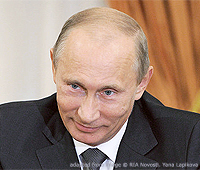NEWSLINK: You’re a Mean One, Mr. Putin; Was 2012 the year Russia’s president finally lost it? – Anders Åslund

[Foreign Policy – Anders Åslund – December 28, 2012 – http://www.foreignpolicy.com/articles/2012/12/28/Putin_orphans_Russia_crackdown]
Anders Åslund examines the state of Russian politics, characterizing it as marked by repression, anger and a realization of a need for change but lacking a grasp of effective alternatives other than personal flight:
… I have not found the mood in the Russian capital so depressed since the collapse of the Soviet Union in 1991. Growing repression has made President Vladimir Putin more feared, but respect for him has plunged deeply as well. People who used to compare Putin with the stern Tsar Nicholas I, who ruled from 1825-1855 and built up the Russian secret police, now deride him as Paul I, the foolish and ineffective tsar who reigned for just five years before being murdered by his exasperated advisers in 1801, much to the relief of his subjects.
Moscow is boiling with aggression and anger, but everybody is unhappy in their own way. A standard statement is: “We are in a dead end.” Muscovites refer to Vladimir Lenin’s definition of a revolutionary situation: “when the upper classes can no longer govern, and the lower classes no longer accept living in the old way.”
The mood is reminiscent of the late Brezhnev period, when nobody thought the system was sustainable, but nobody could see how things could change. Although discontent remains great, opposition protests have ebbed because people see no alternative, leader, or program. In the upper middle class, the dominant theme of conversation is when and where to emigrate. The future is abroad.
At the same time, Åslund notes increases in economic prosperity for some, even as oil remains the mainstay:
Paradoxically, Russia is doing very well economically. The wealth in Moscow is just astounding, not only with its 100 billionaires but also a vast middle class. Macroeconomic data are stellar. The consensus expected 2012 growth rate is 3.6 percent, while neighboring Europe is mired in recession. Russia has a budget surplus and almost no public debt, a huge current account surplus, and bulging international currency reserves. Admittedly, Russia thrives on large energy exports, but oil prices are high and likely to stay there.
Arguing that Putin is more of a creative tactician than a strategic thinker, Åslund casts the Russian strongman as a source of increasing political destablization in the aftermath of election fraud:
… why the sour mood? The popular protests against Putin after the rigged parliamentary elections on Dec. 4, 2011, seem to have pushed him out of balance. His strength has always been tactical improvisation rather than strategy, but that requires self-confidence and inspiration, which now seem to be lacking. His state of the union speech on Dec. 12 was strangely backward-looking. At his rambling, marathon press conference on Dec. 20, he hardly answered any questions over the course of four and a half hours.
Rather than being a guarantor of stability, Putin has suddenly become a source of destabilization. His defensive actions include increased repression against political opposition, a faux campaign against corruption, an anti-American crusade, and obscurantist appeals to Russian nationalism and the Russian Orthodox Church. In a populist vein, he agitates the poorest two-thirds of the population against the wealthy, well-educated, and cosmopolitan. His fundamental problem is that he represents no real values and therefore lacks any source of legitimacy other than stability and economic growth that will not last forever.
Like many authoritarian leaders, Putin presents himself as a convinced democrat … Yet, he quickly betrays his true feelings … reminiscent of fascism. Step by step, Putin is systematically increasing repression of the opposition with new antidemocratic laws …
Even as Putin carries out a purported anti-corruption campaign with varied impact, the long-term economic outlook, with shifts towards more state power, raises questions for Åslund:
The rosy economic numbers, meanwhile, mask a darker reality. Rather than revitalizing the economy through long-needed market economic reforms, Putin is allowing state corporations to suffocate the economy as he seeks to stimulate growth through large, misguided investments. He is ignoring the crisis of moribund Gazprom, which is suffering due to competition resulting from the U.S. shale gas revolution. With their abundant state funds, large state corporations are gobbling up private companies, which in turn devour small enterprises. The total number of enterprises peaked in 2009 and is now falling. The consequences are evident to everyone. Prices in Moscow shops are typically three to four times higher than for the same goods in the United States because of the lack of competition. The dearth of private enterprise is equally evident from the difficulty of getting a cab in Moscow.
Åslund highlights additional chinks in the armor for Putin, arguing that Putin mistakes are piling up, culminating in punishing helpless Russian orphans but cutting off avenues for them to have a better life:
Putin … seems to have lost sense and balance and in reality he has no program. His dominant policy is the current anti-corruption campaign and shallow populism directed …. His line is also anti-American and anti-Western. …
Putin seems to have lost his grasp, making one mistake after the other. Most recently, he punished poor Russian orphans by prohibiting their adoption by Americans … depriv[ing] at least 1,000 Russian orphans a year of a family and home …
Ultimately, Putin’s new attitude is destabilizing and not sustainable. But it is difficult to see any clear alternative. Perhaps that is why Moscovites are so grim.
Click here for full article: http://www.foreignpolicy.com/articles/2012/12/28/Putin_orphans_Russia_crackdown
